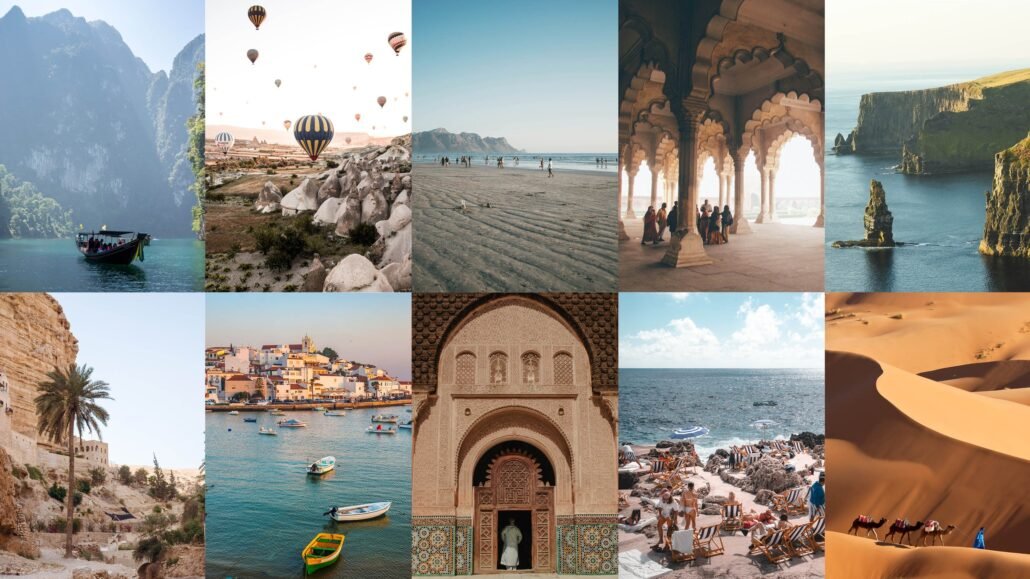A travel budget is a financial plan for your trip expenses. It covers transportation, accommodation, food, activities, and unexpected costs.
Crafting a travel budget is essential for exploring new destinations without breaking the bank. Every traveler, whether backpacking or indulging in luxury, needs a sound financial plan. A well-structured budget ensures you can enjoy your journey’s experiences to the fullest while keeping financial stress at bay.
Efficient budgeting not only helps in managing your funds but also in making informed choices about where and how to travel. It serves as a guide to maximizing your travel experience with the resources available to you. Proper planning and budgeting can lead to more sustainable travel practices, saving both money and the environment.
Magic Of Off-season Adventures
Traveling during off-peak seasons comes with multiple benefits, chief among them being significantly lower accommodation rates. Hotels and vacation rentals often slash prices to attract visitors in these quieter times, resulting in substantial savings for budget-conscious travelers.
Another advantage is the absence of large tourist crowds, which enhances the overall experience. Attractions are less congested, restaurants are more welcoming, and the pace of travel is much more relaxed, allowing for a deeper connection with the destination.
Moreover, don’t overlook the enticing seasonal deals and discounts that many travel-related services offer. Airlines, tour operators, and local businesses frequently provide special rates to encourage off-season travel, presenting an excellent opportunity to explore a destination without breaking the bank.
Local Living For Less
Opting for homestays and hostels can significantly cut down on accommodation costs, allowing an immersion in local culture and traditions. By engaging with communities and establishing connections, travelers gain authentic experiences beyond what typical hotels offer. Sharing spaces in hostels also opens up opportunities for meeting fellow travelers and exchanging tips that could lead to further savings.
Embracing street food is not just about saving money, it’s about tasting a destination’s cuisine straight from the source. The flavors are often more genuine compared to what you may find in upmarket restaurants, and the prices are unbeatably low. Seek out popular spots and enjoy the casual dining atmosphere of bustling market stalls and roadside vendors.
Opt for public transport as a way to navigate a new city. Not only is it less expensive than taxis or car rentals, but it also offers a glimpse into the day-to-day life of locals. Buses, subways, and trains can often be remarkably efficient and are an eco-friendlier choice to getting around.
Airfare Tricks And Timing
Staying vigilant about airfare fluctuations is essential for snagging the best deals. Setting up alerts for price drops can save you a substantial amount on travel expenses. Services like Google Flights or Kayak offer personalized notifications when prices for your desired routes dip. Timing is key; data suggests that Tuesdays and Wednesdays are often the best days to book flights, while flying midweek can also lead to significant savings. Don’t forget airline reward programs, as they offer a valuable avenue to earn miles for future discounts or even free flights. Loyalty to a single airline can pay off with various perks and cost reductions.
Affordable Itineraries
Exploring new destinations doesn’t have to break the bank. Free attractions and tours offer an amazing opportunity to immerse yourself in the culture without spending a single dime. Many cities boast free walking tours, where you can join local guides for insightful explorations. Investigate parks, museums with no entrance fee, and historical sites that are open to the public for free. Discover local markets and landmarks which often provide the essence of a city’s character without any cost.
Smart travelers can significantly reduce expenses by opting for combo tickets. These tickets bundle several attractions or tours into one reduced price, making them ideal for visitors keen on experiencing multiple sights. Look for packages that combine public transport with entrance fees or include multiple museums or galleries. Combo tickets are not only cost-effective but convenient, simplifying your travel experience.
For comprehensive savings, consider investing in a city tourist card. These cards typically offer free or discounted access to major attractions, unlimited use of public transportation, and even discounts at select retailers and restaurants. While the initial outlay might seem high, the potential savings are substantial for active sightseers intending to cover a lot of ground.
Choosing Cost-effective Travel Gear
Securing cost-effective travel gear ensures that your adventures don’t break the bank. Opt for budget-friendly luggage options like basic duffel bags or backpacks from discount stores rather than splurging on high-end brands. These choices often meet airline size requirements and provide adequate space for your belongings.
Packing essentials should include versatile items such as a multipurpose jacket or a sarong that can double as a blanket. By selecting items that serve various needs, travelers can minimize purchases during their trip.
- Durable, multi-use clothing is crucial for any budget-conscious traveler. Items like convertible pants that zip off into shorts or reversible jackets stretch your wardrobe without occupying extra space.
- A high-quality pair of walking shoes will stand the test of time, eliminating the need for multiple pairs.
- Synthetic fabrics dry quickly and are ideal for layering, making them a smart choice for any climate.

Credit: www.asyousow.org
Technology On A Dime
Traveling smart means leveraging technology without breaking the bank. A multitude of free travel apps are available aimed at itinerary planning, currency conversion, and navigating new destinations with ease. Notable mentions include Google Maps and Maps.Me, both offering offline map features essential for areas with limited Internet access.
For those who are always on-the-go, investing in portable chargers is key to staying powered up. Budget-friendly options abound, yet it’s important to seek out reliable brands to avoid unnecessary expenses from quickly deteriorated gear.
| Electronics | Renting | Buying |
|---|---|---|
| Cameras | Cost-effective for short trips | Long-term investment |
| Laptops | Ideal for business travellers | Preferred for frequent use |
| Adapters/Chargers | Suitable for one-off travels | Best to own for compatibility |
Starting A Travel Fund
Starting a Travel Fund requires a disciplined approach, and implementing automatic savings plans is a powerful strategy. Begin by setting up a separate bank account exclusively for travel savings. This separation minimizes the temptation to dip into these funds for other expenses.
Enroll in a savings plan that automatically transfers a predetermined amount of money from your primary account into your travel fund on a regular basis. Opt for weekly or monthly transfers that align with your pay schedule to ensure consistency without straining your regular budget.
Complement your savings efforts with robust budget tracking and finance apps. These tools offer insights into your spending patterns, enabling you to identify areas where you can cut back and redirect those funds to your travel account. Many apps categorize expenditures, making it easier to make adjustments and save more effectively for your next adventure.
Cut Costs On Pre-travel Purchases
Snagging discounted gift cards for airlines and stores can lead to substantial savings when planning a trip. Diligent travelers often scour marketplaces that sell these gift cards at a fraction of the actual value, thereby reducing the overall cost of travel expenditures. For example, a $100 airline gift card might be available for $85, effectively offering a 15% discount on your flight costs.
Leveraging cashback and browser extension deals can also yield significant returns. Many browser extensions notify users of available cashback offers or automatially apply the best coupon codes at checkout. This means that travelers can earn back a percentage of their spending or save instantly without the hassle of searching for deals manually. It’s a savvy way to ensure that every dollar spent on pre-travel purchases works harder for you.
Alternatives To Hotels
Exploring cost-effective accommodations can lead to significant savings on travel expenses. Couchsurfing offers a unique way to meet local hosts and stay for free, oftentimes resulting in authentic cultural exchanges. It is essential to build a solid profile and read host reviews to ensure a safe and enjoyable experience. Another alternative is house sitting, where travelers can stay in someone’s home while taking care of it, sometimes even with pets, during the homeowner’s absence. This can provide a comfortable stay at little to no cost.
Short-term rental platforms like Airbnb and Vrbo give travelers the option to rent apartments, houses, or just a room, which can be more private and homely compared to hotels. Room sharing, on the other hand, is an economical choice especially for solo travelers or those willing to socialize with roommates. Both options often come with amenities such as kitchens, that can further reduce food expenses.
Loyalty Programs And Points
Hotel loyalty programs can be a goldmine for saving money on accommodations. By signing up and staying loyal to a particular hotel chain, you can accumulate points that can be redeemed for free nights, room upgrades, or other perks that can significantly reduce travel expenses. It’s crucial to understand the redemption process and aim for hotels that provide the best value for point redemption. Compare the point conversion rates and special offers across various hotel chains to maximize your rewards.
Utilizing credit card travel benefits is another savvy way to shave dollars off your travel budget. Certain credit cards offer generous points or miles for purchases, which can be applied towards flights, hotels, and other travel expenses. Beyond points, these cards often include benefits like travel insurance, airport lounge access, and no foreign transaction fees. Remember to pick a card that aligns with your travel habits and offers benefits that you will actually use. Always read the credit card’s terms to ensure you get the most out of its travel-related advantages.
Monetize Your Journey
Monetizing your journey through freelancing and remote work offers great flexibility to maintain a steady income while traveling. Diverse online platforms provide opportunities to take on freelance projects that suit your skills, ranging from writing and graphic design to programming and consulting. Establishing a robust client base before embarking on your travels ensures a consistent workflow and financial stability.
Dedicating time to travel blogging or vlogging can also be lucrative, though it often requires building a significant following to attract sponsorships and advertising revenue. Sharing your travel experiences, tips, and photography can help you monetize your journey through various monetization strategies such as affiliate marketing, selling digital products, or partnerships with travel companies.
Volunteer And Exchange Programs
Exploring the world doesn’t have to deplete your savings. Volunteer and exchange programs offer adventurers an opportunity to work in exchange for accommodation and meals. Hostels, farms, and community projects frequently search for energetic individuals willing to contribute their time and skills. Participants not only cut down travel expenses but also immerse in authentic cultural experiences.
Cultural exchange programs, such as WWOOF or Workaway, entail a mutual agreement where travelers provide their labor in return for lodging and food. This symbiotic relationship allows for deep connection with locals, learning new languages, and gaining an intimate understanding of regional lifestyles. Such programs often span various fields, including teaching, agriculture, and hospitality, offering a plethora of options for individuals of different interests and skills.
Crafting A Daily Budget
Crafting a daily budget for travel involves a careful balance of saving and splurging. To estimate daily travel expenses, start by researching the average cost of accommodation, meals, and transportation in your destination. This can vary broadly depending on whether you prefer luxury hotels or are comfortable with hostels and street food. A middle-ground approach might involve a mix of affordable lodgings and occasional indulgences.
To ensure your daily budget is on track, consider using apps or spreadsheets to monitor your expenditures in real-time. Keep an eye on categories like entertainment, souvenirs, and unexpected fees which can add up quickly. By tracking while traveling, you can make informed decisions to stay within budget, or identify areas where you can afford to treat yourself a bit more.
Bargaining And Discounts
Bargaining at local markets can significantly reduce your travel expenses. Engage with vendors using a friendly approach to secure favorable prices. It’s essential to be aware of the general price range of items to negotiate effectively. Remember, persistence can often lead to a successful transaction, but always maintain respect for the seller’s minimum price point.
- Research local markets before your visit to understand the expected price range.
- Use polite language and non-verbal cues to express interest without urgency.
- Walk away if needed; sellers often call shoppers back with a better offer.
- Finalize deals with a respectful agreement that satisfies both parties.
Securing local deals and offers requires a proactive approach. Tourists should engage with local tourism offices, hotel concierges, and travel forums for the latest promotions. Smartphone apps and local coupon sites are valuable resources for discovering current offers. Leverage these to enjoy experiences that may otherwise exceed your budget.
Frequently Asked Questions On Travel Budget
What Is A Good Travel Budget?
A good travel budget varies per person but generally allocates funds for transport, accommodation, food, activities, and emergencies. Plan based on destination costs and personal spending habits for a realistic amount.
How Do You Work Out A Travel Budget?
Determine your destination and travel duration. Estimate costs for transport, accommodation, food, activities, and emergency funds. Track expenses with a budget app to manage spending.
What Should I Calculate For A Trip?
For a trip, calculate your budget, itinerary duration, accommodation costs, transportation expenses, food budget, and any activity or entrance fees. Include a contingency fund for unexpected costs.
What Are The Elements Of A Travel Budget?
A travel budget typically includes transportation, accommodation, food, activities, and emergency funds. It also accounts for insurance, visas, and souvenirs.
Conclusion
Crafting a travel budget doesn’t have to be daunting. It empowers you to explore with financial peace of mind. Remember, effective planning and smart choices stretch your dollars further. Embrace your next adventure, assured your budget is as ready as you are.
Happy travels and smart budgeting go hand-in-hand!




